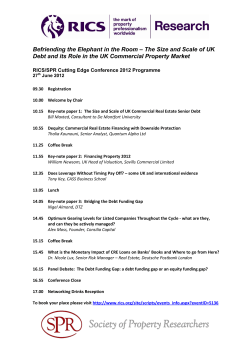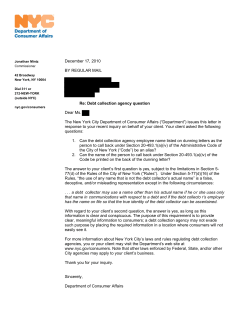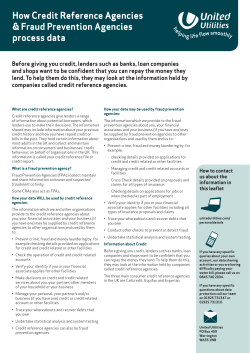
2014 Volume VI No. 10
2014 Volume VI An Assignee Has the Same Right of Non-Dischargeability Under Section 523(a)(2)(B) as the Assignor Justin W. Curcio, J.D. Candidate 2015 Cite as: An Assignee Has the Same Right of Non-Dischargeability Under Section 523(a)(2)(B) as the Assignor, 6 ST. JOHN’S BANKR. RESEARCH LIBR. NO. 10 (2014). Introduction The Bankruptcy Code affords an “honest but unfortunate debtor” a “fresh start” by discharging certain prior financial obligations of the debtor. 1 The bankruptcy process allows debtors to “reorder their affairs, make peace with their creditors, and enjoy ‘a new opportunity in life with a clear field for future effort, unhampered by the pressure and discouragement of preexisting debt.’”2 However, there are limitations on a debtor’s ability to obtain a discharge. For example, a creditor that lent money to a debtor based on a fraudulent writing can seek a determination that the debt is non-dischargeabile under section 523(a)(2)(B).3 Issues arise where the original lender assigns the debt to a third party that in turn asserts that the debt is non-dischargeable. Specifically, the debtor may argue that the assignee can assert a non-dischargeability claim because a fraud claim is unassignable and/or the assignee cannot assert reliance since it was the original lender that actually relied on the misrepresentations. Recently, in Pazdzierz v. First American Title Insurance Co., the Sixth Circuit recently held that an assignee of a loan that the debtor allegedly obtained through a fraudulent writing could assert 1 See Grogan v. Garner, 498 U.S. 279, 286–87. See id. at 286 (quoting Local Loan Co. v Hunt, 292 U.S. 234, 244). 3 11 U.S.C. § 523(a)(2)(B)(2006) (stating that debt may not be discharged for money obtained by fraudulent writing of debtor). 2 No. 10 that the debt was non-dischargeable.4 There, the court rejected the debtor’s argument that the assignee “could not pursue an action under [section] 523(a)(2)(B) because it was an assignee of an interest in the [promissory] notes and, under Michigan law, claims for fraud cannot be assigned.”5 The court determined the assignee was not asserting a naked claim for fraud, but rather, the assignee was seeking to enforce its rights under the promissory notes, which may be transferred under Michigan law.6 Moreover, the court held that the assignee could assert the same reliance as the original lender.7 The Pazdzierz ruling reinforces the idea that a debt purchaser has the same nondischargeability rights as the original lender, which will allow an assignee to assert that its debt is non-dischargeabile under section 523(a)(2)(B). This Article examines the issue presented in Pazdzierz and is separated into four parts. Part I discusses the standard for asserting that a debt is not dischargeable pursuant to section 523(a)(2)(B). Part II discusses that when fraud is not at issue, an assignee can assert section 523(a)(2)(B) non-dischargeability. Part III discusses how an assignee can assert the same reliance as the assignor under section 523(a)(2)(B). Part IV discusses the implications of Pazdzierz. I. Standards for Determining a Debt is Non-Dischargeable Under Section 523(a)(2)(B) When a debtor files for bankruptcy, all his or her debts are generally dischargeable. Congress recognized, however, that certain debts should not be discharged in bankruptcy and therefore, enacted section 523 of the Bankruptcy Code.8 For example, debts incurred from certain taxes, through fraudulent means, maliciously injuring another person, domestic support 4 11 U.S.C. § 523(a)(2)(B) (2006); see Pazdzierz v. First American Title Insurance Co. (In re Pazdzierz), 718 F.3d 582, 590 (6th Cir. 2013). 5 See In re Pazdzierz, 718 F.3d at 585. 6 See id. at 590. 7 See id. at 585. 8 See 11 U.S.C. § 523 (listing types of non-dischargeable debts). Curcio − 2 obligations or most student loan debts are a few of the instances where a debt will be nondischageable.9 Procedurally, the way in which a debt is determined to be non-dischargeable will depend on the type of debt. On one hand, certain subsections 523 of the Bankruptcy Code, such as section 523(a)(8), which provides that student loan debt non-dischargeable unless excepting such debt would cause an undue hardship on the debtor, are self-executing, meaning that the debt is not dischargeable unless the debtor establishes otherwise.10 As such, the debtor must commence an adversary proceeding and establish that the debt covered by such a self-executing subsection is dischargeable.11 On the other hand, the other subsections of section 523, including section 523(a)(2)(B) are not self-executing and require affirmative action by a creditor. In particular, a creditor also has the burden of pursuing an adversary proceeding and establishing that the debt is non-dischargeabile.12 Section 523(a)(2)(B) of the Bankruptcy Code provides that certain debts, procured by the debtor through the use fraudulent writings, are non-dischargeable.13 In order to obtain a determination that a debt is non-dischargeable under section 523(a)(2)(B), the creditor must commence an adversary proceeding and establish that he or she materially relied on a materially false written statement regarding the debtor’s financial condition that was made by the debtor with the intent to deceive the creditor.14 Issues arise where the original lender assigns the debt to a third party that in turn asserts that the debt is non-dischargeable. Specifically, the debtor may argue that the assignee can assert a non-dischargeability claim because a fraud claim is 9 See 11 U.S.C. § 523. See, e.g., Espinosa v. United Student Aid Funds, Inc., 559 U.S. 260, 274-75 (2010); see also 11 U.S.C. 10 523(a)(8). 11 See, e.g., Espinosa, 559 U.S. at 263-64 (citing FED. R. BANKR. P. 7001(6)). See, e.g., Pazdzierz, 718 F.3d at 585; see also FED. R. BANKR. P. 7001(6). 13 11 U.S.C. § 523(a)(2)(B). 14 See id. 12 Curcio − 3 unassignable and/or the assignee cannot assert reliance since it was the original lender that actually relied on the misrepresentations. II. As Assignee Can Assert that a Debt Is Non-Dischargeable Section 523(a)(2)(B) Notwithstanding the Prohibition Against Assigning Fraud Claims When a creditor seeks non-dischargeability of a debt procured through a materially false writing that was intended to deceive, the creditor must satisfy the elements of section 523(a)(2)(B) of the Bankruptcy Code, which are the same elements as a common law fraud claim.15 If this debt arises from claim that arises from something other than fraud, an assignee can assert that the debt is non-dischargeable section 523(a)(2)(B) non-dischargeability, just as the original creditor could, because “‘where the right to enforce a claim which is in itself assignable depends upon showing fraud incidentally the [prohibition against assigning fraud claims] has no application.’”16 In Pazdzierz, the debtor provided false information on his loan applications in order to obtain loans from a lender.17 Immediately after the loans closed, the lender assigned promissory notes and mortgages to an assignee.18 At some point, the debtor defaulted.19 The assignee then filed claims with its title insurer under title commitments and closing protection letters issued in connection with the loans.20 The assignee and the title insurer eventually settled these claims, whereby the assignee assigned seventy-five percent of its interests in the promissory notes to the title insurer in exchange for an agreed upon sum of money.21 After the debtor filed for 15 law) Compare id. and Pazdzierz, 718 F.3d at 587 n.2 (listing the elements for a fraud claim under Michigan 16 See Pazdzierz, 718 F.3d at 587 (quoting Howd v. Breckenridge, 56 N.W. 221, 222 (Mich. 1893) (emphasis added in original)). 17 See id. at 585 (Pazdzierz received over $750,000.00 in loans by providing false information regarding his income, assets, and employment). 18 Id. 19 Id. 20 Id. at 584. 21 Id. at 585. Curcio − 4 bankruptcy, the title insurer as an assignee filed an complaint initiating an adversary proceeding, which sought a determination that the loan debt was non-dischargeable under section 523(a)(2)(B) because the debtor had used the fraudulent applications to obtain the loans.22 The debtor moved for summary judgment, arguing that the title insurer could not pursue an action under section 523(a)(2)(B).23 The debtor argued that the title insurer “could not pursue an action under [section] 523(a)(2)(B) because it was an assignee of an interest in the notes” and, as an assignee in Michigan, cannot assert a claim of fraud as the lender.24 Under Michigan law, claims for fraud cannot be assigned and debtor argued that title insurance therefore, cannot pursue non-dischargeability in Michigan because the fraud is embedded in such a nondischargeability assertion.25 Consequently, the right of non-dischargeability under section 523(a)(2)(B) cannot be assigned because it is rooted in fraud and an assignee does not possess these same rights as a lender when asserting a claim of fraud.26 The assignee responded to debtor’s argument by asserting that their non-dischargeability action was not asserting a fraud claim but rather was attempting to enforce the debts owed under promissory notes.27 The assignee’s argument relied on the fraud being only incidental to the non-dischargeability claim.28 Fraud is not at issue in this case, therefore, the assignee argued that it is not seeking an action of fraud but rather seeks non-dischargeability of debt obtained through fraud.29 22 Id. at 584–85 (original Creditor discovered that Pazdzierz did not hold title to any of properties used in securing the promissory notes). 23 Id. at 585. 24 Id. 25 Id. at 586 (quoting Raleigh, 530 U.S. at 20 “Creditors’ entitlements in bankruptcy arise in the first instance from the underlying substantive law creating the debtor’s obligation, subject to any qualifying or contrary provisions of the Bankruptcy Code.”). 26 Id. at 587 (Pazdzierz believes that since the claim of non-dischargeability is rooted in fraud, it cannot be assigned because state law prohibits the assignment of claims of fraud). 27 Id. 28 Id. (section 523(a)(2)(B) prevents a debtor from discharging debt during bankruptcy when loans were obtained through fraud). 29 Id. at 585. Curcio − 5 The bankruptcy court barred title insurer from seeking an order of non-dischargeability because only the lender can have a claim of non-dischargeability based in fraud because state law prevents an action in fraud to be assigned.30 Since the non-dischargeability claim is rooted in fraud, the bankruptcy court held it was not assignable under Michigan Law. 31 The United States District Court for the Eastern District of Michigan reversed the holding of the bankruptcy court.32 Debtor appealed and the Sixth Circuit affirmed the district court’s holding.33 The Sixth Circuit rejected the debtor’s argument. Section 523(a)(2)(B) nondischargeability claim only has an incidental aspect of fraud.34 The court held that the assignee was not attempting to pursue a naked claim of fraud but rather sought to enforce its rights under the promissory notes, including the right to seek a determination that the debt is nondischargeable.35 As a result, the state law prohibiting the assignment of a fraud claim was inapplicable.36 Therefore, a purchaser of promissory notes could seek non-dischargeability under section 523(a)(2)(B).37 III. An Assignee Can Assert the Same Reliance as the Assignor Under Section 523(a)(2)(B) In order to establish that a debt is non-dischargeable under section 523(a)(2)(B), the creditor must establish that it reasonably relied on a materially false writing that the debtor made in order to obtain money, property, services, or an extension, renewal, or refinancing of 30 Id. at 586–87. Id. at 586, 587 n. 2 (“Under Michigan Law, actionable fraud requires: (1) That defendant made a material representation; (2) that is was false; . . . (5) that plaintiff acted in reliance upon it; and (6) that he thereby suffered injury.” Such a claim of actionable fraud needs to be asserted by the party who relied upon it.) 32 See id. at 590. 33 See id. 34 See id. 35 Id. at 588. 36 See id. (“[T]he Michigan courts would not treat the instant assignment as one inviting an action arising from fraud.”). 37 See id. 31 Curcio − 6 credit.38 An issue that arises in cases in which debt has been assigned is whether the assignee can assert the assignor’s reliance in the non-dischargeability actions.39 The Pazdzierz court held that an assignee may assert the same reliance as the original creditor to seek non-dischargeability under section 523(a)(2)(B).40 In so holding, the Sixth Circuit in In re Pazdzierz relied on the Seventh and Ninth Circuit Courts’ decisions holding that an assignee can assert the same reliance as the assignor, so it appears that the Sixth Circuit is leaning that way as well.41 As such, the circuits that have addressed this issue have unanimously agreed that the assignee can assert such reliance.42 For example, the Seventh Circuit addressed whether an assignee can seek nondischargeability under section 523(a)(2)(B) in Federal Deposit Insurance Corp. v. Meyer (In re Meyer).43 There, the court held that a lender can transfer its rights against debtors to an assignee and the assignee did not need to directly rely on the debtor’s fraudulent assertions.44 The lender reasonably relying on the fraudulent statements of the debtor is enough to seek nondischargeability and the right of non-dischargeability transfers to any subsequent party the lender assigns the promissory notes to.45 It is a fundamental aspect of contract law that a creditor can transfer its rights to a third party.46 Accordingly, an assignee would have the same rights of nondischargeability as the lender originally did.47 38 11 U.S.C. § 523(a)(2)(B). See Pazdzierz, 718 F.3d at 590. 40 Id. at 590 (“The Sixth Circuit has not addressed whether an assignee may stand in place of the original creditor to seek non-dischargeability under [section] 523(a)(2)(B). Pazdzierz advances no compelling reason we should not join the Seventh and Ninth Circuits in concluding that assignees may seek non-dischargeability under [section] 523(a)(2).”). 41 See id. (the Sixth Circuit ruling in favor of assignee because there was “no compelling reason” not too). 42 See id.; Fed. Deposit Ins. Corp. v. Meyer (In re Meyer), 120 F.3d 66 (7th Cir. 1997); Boyajian v. New Falls Corp. (In re Boyajian), 564 F.3d 1088 (9th Cir. 2009). 43 See Meyer, 120 F.3d at 66. 44 Id. 45 Id. 46 Id. 47 Id. 39 Curcio − 7 Similarly, the Ninth Circuit also addressed whether an assignee can seek nondischargeability under section 523(a)(2)(B) in Boyajian v. New Falls Corp. (In re Boyajian).48 The court held that an assignee has the same rights of reliance as the lender.49 The Ninth Circuit explained that a “narrow focus simply on the verb tense . . . does not capture the proper meaning of [section] 523(a)(2)(B).”50 Congress’ true intentions of this section is to prevent the discharge of debt obtained through deceitful means, regardless if the party in possession of the promissory notes specifically relied on the fraud.51 Thus, an assignee purchasing promissory notes can seek non-dischargeability under section 523(a)(2)(B), just the same as the lender.52 IV. Implications The circuit courts have been unanimous in their decisions to allow an assignee to assert the same former rights as the assignor when petitioning for section 523(a)(2)(B) nondischargeability.53 An assignee is able to assert the same reliance as the original creditor, when the original creditor relied on a debtor’s fraudulent material written statement when offering a loan.54 This is significant for all assignees because they do not have to have any interaction with the debtor to assert non-dischargeability under section 523(a)(2)(B). Therefore, an assignee can be reassured that he or she can seek non-dischargeability under section 523(a)(2)(B) similar to that of the lender. This decision may also have implications for distressed-debt purchasers in particular. Following Pazdzierz, Meyer, and Boyajian, s distressed debt purchaser may want to consider being more aggressive when seeking to enforce debts it purchased because it will able to assert 48 Boyajian, 564 F.3d at 1088. Id. 50 Id. 51 Id. 52 Id. 53 See In re Boyajian 564 F.3d 1088; In re Meyer), 120 F.3d 66. 54 See id. 49 Curcio − 8 the same reliance as the original creditor when seeking a non-dischargeability determination under section 523(a)(2)(B). As such, such a purchaser may be able to extract value through a non-dischargeability adversary proceeding even if the purchaser and the debtor ultimately settle because the purchaser likely only paid pennies on the dollar for the claim. Ultimately, preventing a debtor from escaping non-dischargeability when the promissory note is assigned creates the sound policy of placing the burden of debt on the debtor who acted fraudulently. Section 523(a)(2)(B) is designed to prevent a debtor from escaping debt procured through a fraudulent writing. Consistent with that purpose, courts will not permit a debtor to escape a debt incurred through fraud as result of the mere coincidence that the original creditor assigned its claims to an assignee. Conclusion Section 523(a)(2)(B) of the Bankruptcy Code allows a creditor that relied on a fraudulent writing to seek a determination that the debt is non-dischargeabile. Likewise, notwithstanding the general prohibition against assigning fraud claims, an assignee of the original creditor’s claim will also be assert that the claim is non-dischargeable under section 523(a)(2)(B) so as long as the claim itself is based on fraud. Moreover, the assignee will be able to assert the same reliance as the original creditor under section 523(a)(2)(B). Thus, an assignee will be able to enforce its claim to the same extent that the original creditor could have, including seeking a nondischargeability determination under section 523(a)(2)(B). Curcio − 9
© Copyright 2024









